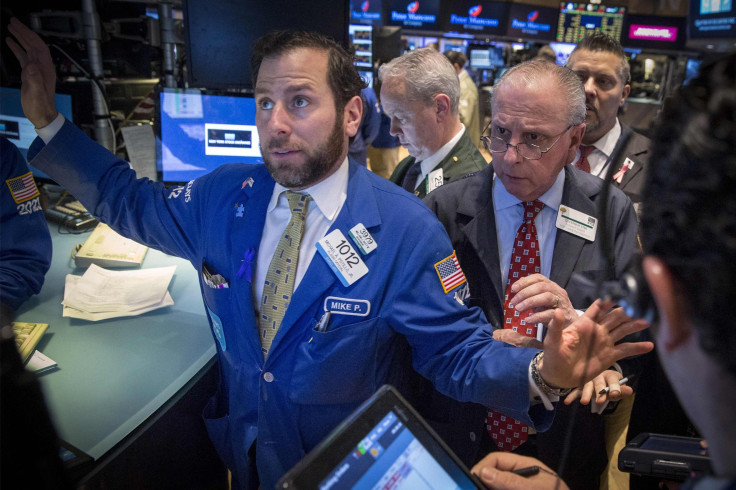Dow Jones Industrial Average Tumbles 200 Points As Investors Fear Interest Rate Hike

U.S. stocks traded sharply lower Tuesday, with the Dow Jones Industrial Average tumbling more than 200 points, following a drop in crude oil prices. Investors were also cautious after the U.S. dollar surged to multiyear highs against the euro and the Japanese yen, driven by speculation that the U.S. Federal Reserve could raise interest rates sooner than previously thought.
The Dow, which measures the share prices of 30 large industrial companies, plunged 215.49 points, or 1.20 percent, to 17,780.23. The S&P 500 stock index fell 23.39 points, or 1.13 percent, to 2,055.84. The Nasdaq composite dropped 65.19 points, or 1.32 percent, to 4,877.44.
The euro and the Japanese yen fell under pressure Tuesday, along with emerging market currencies, after concerns of a rate hike sooner rather than later from the Federal Reserve spooked investors, causing volatility in the global financial markets. The euro tumbled as low as $1.08 against the U.S. dollar, the lowest since September 2003. The greenback also rose as high as 122.02 against the yen, a high not seen since July 2007.
Most economists expect the Federal Reserve is on course to hike rates in mid-2015 despite a backdrop of divergence between global central banks. As the Fed prepares to tighten its monetary policy stance, other central banks across the world, including the European Central Bank and the Bank of Japan, are loosening policy through quantitative easing programs aimed at spurring economic growth.
Global investors view the U.S. as a place to achieve more consistent growth, and a stronger greenback is adding a boost to foreign investors' returns, Chad Morganlander, portfolio manager at Washington Crossing Advisors, said in a research note Monday.
“The mere fact that the [Federal Reserve] are doing it while the rest of the world is moving toward further easing means that the world’s reserve currency, the U.S. dollar, is again the global investor’s go-to currency, as evidenced in the dollar’s 20 percent gain since last summer,” Morganlander said in a research note Monday.
The volatility also comes as a top Fed official said Monday that the central bank should promptly end its current policy position and move forward with an interest rate hike. "The idea that we can substitute a steeper future funds rate path for an early liftoff seems risky to me," Richard Fisher, president of the Dallas Federal Reserve Bank, said Monday during his final speech as a policymaker. "I would rather the FOMC [Federal Open Market Committee] raise rates early and gradually than late and steeply."
U.S. stocks were also weighed down in morning trading on renewed concerns about Greece's ongoing debt negotiations, as eurozone finance ministers prepare to meet with Athens officials Wednesday.
Oil prices traded lower Tuesday, falling below $50 a barrel, on concerns that global crude inventories will continue to build, weighing on the energy sector. West Texas Intermediate crude, the benchmark for U.S. oil prices, fell 1.20 percent, to $49.40 a barrel, for April 15 delivery on the New York Mercantile Exchange. Meanwhile, Brent crude, the benchmark for global oil prices, dropped 2.49 percent, to $57.07 a barrel, for April 15 delivery on the London ICE Futures Exchange.
© Copyright IBTimes 2025. All rights reserved.






















